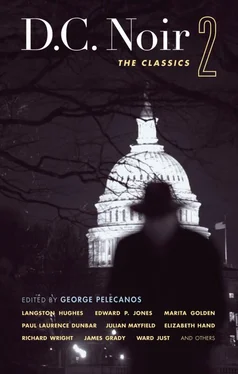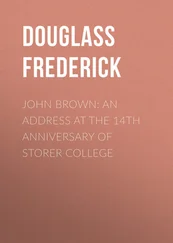Three weeks after Horace and Loneese moved in, Horace went down to the lobby one Saturday afternoon to get their mail and happened to see Clara Knightley getting her mail. She lived in Apartment 512. “You got this fixed up real nice,” Horace said of Apartment 512 a little less than an hour after meeting her. “But I could see just in the way that you carry yourself that you got good taste. I could tell that about you right off.” “You swellin my head with all that talk, Mr. Perkins,” Clara said, offering him coffee, which he rejected, because such moments always called for something stronger. “Whas a woman’s head for if a man can’t swell it up from time to time. Huh? Answer me that, Clara. You just answer me that.” Clara was fifty-five, a bit younger than most of the residents of Claridge, though she was much older than all Horace’s other lovers. She did not fit the city government people’s definition of a senior citizen, but she had a host of ailments, from high blood pressure to diabetes, and so the city people had let her in.
Despite the promises, the marriage, what little there had been of it, came to an end. “I will make myself happy,” Loneese told the diary a month after he last touched her. Loneese and Horace had fixed up their apartment nicely, and neither of them wanted to give the place up to the other. She wanted to make a final stand with the man who had given her so much heartache, the man who had told her, six months after her confession, what a whore she had been to sleep with the Commerce Department mail-room man. Horace, at sixty, had never thought much of women over fifty, but Clara — and, after her, Willa, of Apartment 1001, and Miriam, of Apartment 109 — had awakened something in him, and he began to think that women over fifty weren’t such a bad deal after all. Claridge Towers had dozens of such women, many of them attractive widows, many of them eager for a kind word from a retired army sergeant who had so many medals and ribbons that his uniform could not carry them. As far as he could see, he was cock of the walk: many of the men in Claridge suffered from diseases that Horace had so far escaped, or they were not as good-looking or as thin, or they were encumbered by wives they loved. In Claridge he was a rich man. So why move and give that whore the satisfaction?
They lived separate lives in a space that was only a fourth as large as the Chesapeake Street house. The building came to know them as the man and wife in 230 who couldn’t stand each other. People talked about the Perkinses more than they did about anyone else, which was particularly upsetting to Loneese, who had been raised to believe family business should stay in the family. “Oh, Lord, what them two been up to now?” “Fight like cats and dogs, they do.” “Who he seein now?” They each bought their own food from the Richfood on 11th Street or from the little store on 13th Street, and they could be vile to each other if what one bought was disturbed or eaten by the other. Loneese stopped speaking to Horace for nine months in 1984 and 1985, when she saw that her pumpkin pie was a bit smaller than when she last cut a slice from it. “I ain’t touch your damn pie, you crazy woman,” he said when she accused him. “How long you been married to me? You know I’ve never been partial to pumpkin pie.” “That’s fine for you to say, Horace, but why is some missing? You might not be partial to it, but I know you. I know you’ll eat anything in a pinch. That’s just your dirty nature.” “My nature ain’t no more dirty than yours.”
After that, she bought a small icebox for the bedroom where she slept, though she continued to keep the larger items in the kitchen refrigerator. He bought a separate telephone, because he complained that she wasn’t giving him his messages from his “associates.” “I have never been a secretary for whores,” she said, watching him set up an answering machine next to the Hide-A-Bed couch where he slept. “Oh, don’t get me started bout whores. I’d say you wrote the damn book.” “It was dictated by you.”
Their one child, Alonzo, lived with his wife and son in Baltimore. He had not been close to his parents for a long time, and he could not put the why of it into words for his wife. Their boy, Alonzo Jr., who was twelve when his grandparents moved into Claridge, loved to visit them. Horace would unplug and put away his telephone when the boy visited. And Loneese and Horace would sleep together in the bedroom. She’d put a pillow between them in the double bed to remind herself not to roll toward him.
Their grandson visited less and less as he moved into his teenage years, and then, after he went away to college, in Ohio, he just called them every few weeks, on the phone they had had installed in the name of Horace and Loneese Perkins.
In 1987, Loneese’s heart began the countdown to its last beat and she started spending more time at George Washington University Hospital than she did in the apartment. Horace never visited her. She died two years later. She woke up that last night in the hospital and went out into the hall and then to the nurses’ station but could not find a nurse anywhere to tell her where she was or why she was there. “Why do the patients have to run this place alone?” she said to the walls. She returned to her room and it came to her why she was there. It was nearing three in the morning, but she called her own telephone first, then she dialed Horace’s. He answered, but she never said a word. “Who’s this playin on my phone?” Horace kept asking. “Who’s this? I don’t allow no playin on my phone.” She hung up and lay down and said her prayers. After moving into Claridge, she had taken one more lover, a man at Vermont Avenue Baptist Church, where she went from time to time. He was retired, too. She wrote in her diary that he was not a big eater and that “down there, his vitals were missing.”
Loneese Perkins was buried in a plot at Harmony Cemetery that she and Horace had bought when they were younger. There was a spot for Horace and there was one for their son, but Alonzo had long since made plans to be buried in a cemetery just outside Baltimore.
Horace kept the apartment more or less the way it was on the last day she was there. His son and daughter-in-law and grandson took some of her clothes to the Goodwill and the rest they gave to other women in the building. There were souvenirs from countries that Loneese and Horace had visited as man and wife — a Ghanaian carving of men surrounding a leopard they had killed, a brass menorah from Israel, a snow globe of Mount Fuji with some of the snow stuck forever to the top of the globe. They were things that did not mean very much to Alonzo, but he knew his child, and he knew that one day Alonzo Jr. would cherish them.
Horace tried sleeping in the bed, but he had been not unhappy in his twelve years on the Hide-A-Bed. He got rid of the bed and moved the couch into the bedroom and kept it open all the time.
He realized two things after Loneese’s death: His own “vitals” had rejuvenated. He had never had the problems other men had, though he had failed a few times along the way, but that was to be expected. Now, as he moved closer to his seventy-third birthday, he felt himself becoming ever stronger, ever more potent. God is a strange one, he thought, sipping Chivas Regal one night before he went out: he takes a man’s wife and gives him a new penis in her place.
The other thing he realized was that he was more and more attracted to younger women. When Loneese died, he had been keeping company with a woman of sixty-one, Sandy Carlin, in Apartment 907. One day in February, nine months after Loneese’s death, one of Sandy’s daughters, Jill, came to visit, along with one of Jill’s friends, Elaine Cunningham. They were both twenty-five years old. From the moment they walked through Sandy’s door, Horace began to compliment them — on their hair, the color of their fingernail polish, the sharp crease in Jill’s pants (“You iron that yourself?”), even “that sophisticated way” Elaine crossed her legs. The young women giggled, which made him happy, pleased with himself, and Sandy sat in her place on the couch. As the ice in the Pepsi-Cola in her left hand melted, she realized all over again that God had never promised her a man until her dying day.
Читать дальше











